February 13, 2023 •
Arizona Increases Campaign Contribution Limits

Arizona State Capitol - by Visitor7
The Arizona Secretary of State’s Office has increased campaign contribution limits for the 2023-2024 election cycle. An individual may now contribute $5,400 per election cycle to a candidate committee for statewide office and legislative office. Additionally, an individual may contribute […]
The Arizona Secretary of State’s Office has increased campaign contribution limits for the 2023-2024 election cycle.
An individual may now contribute $5,400 per election cycle to a candidate committee for statewide office and legislative office.
Additionally, an individual may contribute $6,650 per election cycle to a candidate committee for district, county, town, and city office.
Contribution limits for PACs have also increased. A PAC without Mega PAC status may contribute $5,400 per election cycle to a candidate for statewide office.
In contrast, a PAC with Mega PAC status may contribute $10,800 per election cycle to candidates for statewide and legislative office, and $13,300 per election cycle to candidates for district, county, town, and city office.
These increases are implemented by the secretary of state in January of odd-numbered years.
August 30, 2021 •
Wisconsin Lawmakers Introduced Seven Bills to Overhaul Campaign Finance
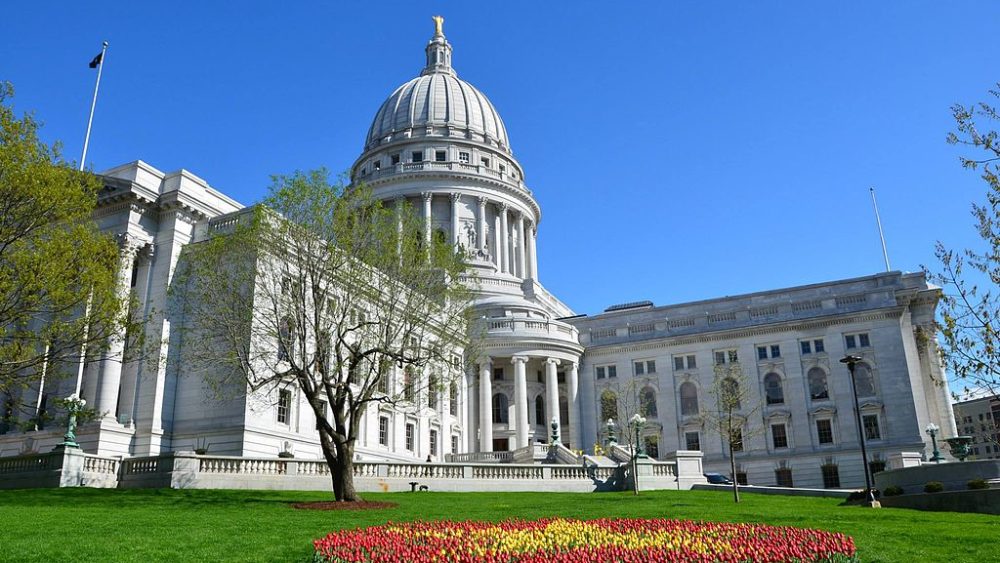
Wisconsin State Capitol Building
Wisconsin lawmakers introduced seven bills to address a campaign finance system perceived to favor wealthy donors. The proposed campaign finance reforms include lower contribution limits for statewide candidates; a broader definition of political action committee; a prohibition on making expenditures […]
Wisconsin lawmakers introduced seven bills to address a campaign finance system perceived to favor wealthy donors.
The proposed campaign finance reforms include lower contribution limits for statewide candidates; a broader definition of political action committee; a prohibition on making expenditures for certain mass communications if coordinated with a candidate; a prohibition on corporate or labor organization contributions to a segregated fund; and disclosure of donor employment information for cumulative contributions of more than $100.
January 22, 2020 •
West Virginia Senate Considering Bill Changing Contributions Limits

West Virginia Capitol Building - O Palsson
A bill has been introduced in the Senate setting new limits on political contributions. Senate Bill 566 would reduce current limits on contributions to candidates from $2,800 to $1,000 per election. Additionally, contributions to a PAC related to a particular […]
A bill has been introduced in the Senate setting new limits on political contributions.
Senate Bill 566 would reduce current limits on contributions to candidates from $2,800 to $1,000 per election.
Additionally, contributions to a PAC related to a particular election reduce from $5,000 to $1,000.
The bill would also reduce contributions limits to state party executive committees from $10,000 to $1,000 per calendar year.
January 8, 2020 •
Seattle City Council Considering Caps on Super PAC Donations
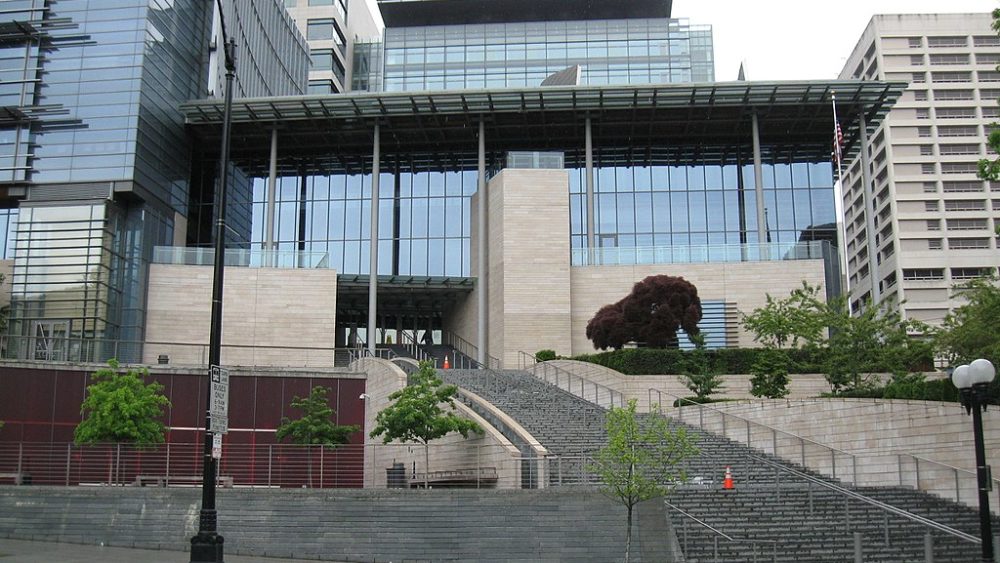
Seattle City Hall - Rootology
The Seattle City Council is considering legislation limiting the ability of Super PACs to spend unlimited amounts of money in Seattle elections. Council Member Lorena González introduced the Clean Campaigns Act to reduce the amount of money Super PACs funnel […]
The Seattle City Council is considering legislation limiting the ability of Super PACs to spend unlimited amounts of money in Seattle elections.
Council Member Lorena González introduced the Clean Campaigns Act to reduce the amount of money Super PACs funnel into elections.
The proposed legislation would limit Super PACs from receiving more than $5,000 per year from any single individual or corporation.
The act would also block multinational corporations, defined as companies with more than one percent ownership from a single foreign national or more than five percent ownership from multiple foreign nationals, from spending money on local elections.
Another proposed change would require all political advertising outside of election years to follow similar reporting requirements to current rules for election advertisements.
The Clean Campaigns Act is currently being considered in council chambers and could see a full council vote as early as next week.
September 23, 2019 •
Montana Increases Campaign Contribution Limits
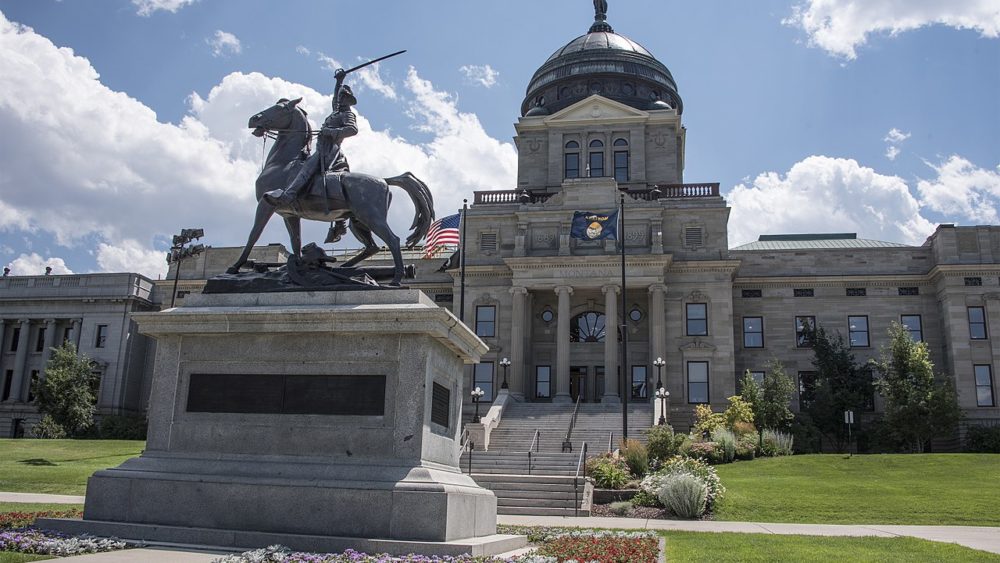
Montana Capitol Building - gillfoto
Campaign contribution limits increased following an every other year adjustment to match inflation required by state law. The amount an individual or PAC may give to a campaign for governor rose from $680 to $710 per election. The aggregate amount […]
Campaign contribution limits increased following an every other year adjustment to match inflation required by state law.
The amount an individual or PAC may give to a campaign for governor rose from $680 to $710 per election.
The aggregate amount a PAC may give to a candidate for state Senate rose from $2,850 to $3,050.
Additionally, the same amount rose from $1,750 to $1,850 for a candidate for state House.
The Commissioner of Political Practices is in charge of calculating the increase by multiplying last cycle’s limits by an inflation factor provided by statute.
The new contribution limits took effect September 21. Contributions made before that date are subject to the old limits.
However, those who have already given money may contribute again up to the new limits.
April 10, 2019 •
Missouri Appeals Court Upholds PAC Contribution Ban
Missouri corporations may not make direct contributions to their own PACs, the Court of Appeals for the Western District affirmed on April 9. The appeals court ruling upheld a similar 2018 finding in the Missouri Chamber of Commerce and Industry’s […]
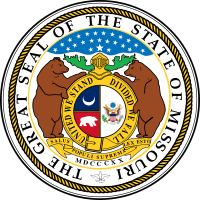 Missouri corporations may not make direct contributions to their own PACs, the Court of Appeals for the Western District affirmed on April 9.
Missouri corporations may not make direct contributions to their own PACs, the Court of Appeals for the Western District affirmed on April 9.
The appeals court ruling upheld a similar 2018 finding in the Missouri Chamber of Commerce and Industry’s lawsuit against the Missouri Ethics Commission.
There, the chamber challenged two of the commission’s ethics opinions that prohibited corporations from contributing directly to the PACs they form.
The Cole County Circuit Court issued a judgment in favor of the commission, determining corporations that serve as connected organizations cannot contribute corporate funds to their connected PACs.
April 5, 2019 •
Utah Campaign Finance Bills Signed
Last week, Gov. Gary Herbert signed six bills amending the state’s campaign finance laws. Updates include amended registration and reporting requirements for political action committees (PACs) and political issues committees (PICs). Additionally, updates modify provisions relating to the statement of […]
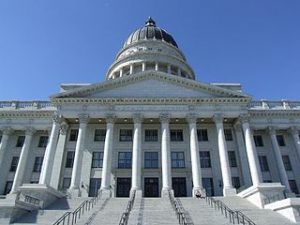 Last week, Gov. Gary Herbert signed six bills amending the state’s campaign finance laws.
Last week, Gov. Gary Herbert signed six bills amending the state’s campaign finance laws.
Updates include amended registration and reporting requirements for political action committees (PACs) and political issues committees (PICs).
Additionally, updates modify provisions relating to the statement of organization and naming requirements of a PAC.
Other changes include a provision banning PICs from contributing to PACs and clarifications on how to dissolve a PAC.
Regarding electioneering communications, House Bill 319 requires a person making an expenditure for certain advertisements relating to a ballot proposition to disclose the person’s identity in the advertisement.
All bills take effect on May 13, 2019.
March 28, 2019 •
West Virginia Governor Signs Campaign Contribution Bill
Gov. Jim Justice signed Senate Bill 622 on March 27, with an effective date of June 7. The bill increases campaign contribution limits allowing $2,800 to candidates, $5,000 to political action committees (PACs), and $10,000 to party committees. The current […]
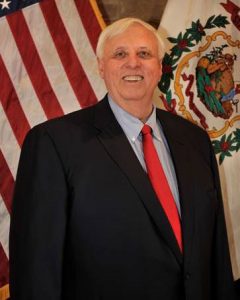 Gov. Jim Justice signed Senate Bill 622 on March 27, with an effective date of June 7.
Gov. Jim Justice signed Senate Bill 622 on March 27, with an effective date of June 7.
The bill increases campaign contribution limits allowing $2,800 to candidates, $5,000 to political action committees (PACs), and $10,000 to party committees. The current limits for each category are set at $1,000.
PACs will also be required to electronically file all independent expenditure reports and financial statements.
The bill also requires federal PACs who spend money on state elections to file disclosures with the Office of Secretary of the State.
February 28, 2019 •
Wyoming Legislature Adjourns Sine Die
The Wyoming Legislature adjourned sine die in the early hours of February 28. The House spent the final day of its 2019 legislative session overriding four of Gov. Mark Gordon’s 14 vetoes, but the Senate decided to only override two […]
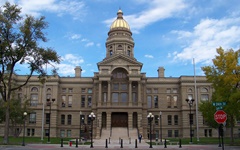 The Wyoming Legislature adjourned sine die in the early hours of February 28.
The Wyoming Legislature adjourned sine die in the early hours of February 28.
The House spent the final day of its 2019 legislative session overriding four of Gov. Mark Gordon’s 14 vetoes, but the Senate decided to only override two of those four.
Earlier this month, Gov. Gordon signed Senate File 18 into law, which requires any candidate, political action committee, and candidate’s campaign committee to file an itemized statement of contributions and expenditures at least seven days but not more than 14 days before an election.
February 4, 2019 •
Oklahoma Restricts Contributions During Legislative Session
Beginning Monday, February 4, through five calendar days following sine die adjournment, several actions regarding campaign contributions by lobbyist principals are prohibited in Oklahoma. A lobbyist or lobbyist principal must not make a campaign contribution to a member of the […]
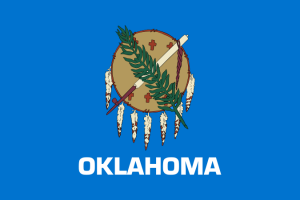 Beginning Monday, February 4, through five calendar days following sine die adjournment, several actions regarding campaign contributions by lobbyist principals are prohibited in Oklahoma.
Beginning Monday, February 4, through five calendar days following sine die adjournment, several actions regarding campaign contributions by lobbyist principals are prohibited in Oklahoma.
A lobbyist or lobbyist principal must not make a campaign contribution to a member of the legislature or a candidate for state legislative office; promise to make a campaign contribution for a member of the legislature or candidate for state legislative office; or solicit a campaign contribution for a member of the legislature or candidate for state legislative office.
A member of the Legislature or a candidate for state legislative office must not intentionally solicit a campaign contribution from a lobbyist or lobbyist principal; or intentionally accept a campaign contribution from a lobbyist or lobbyist principal.
A contribution from a lobbyist or lobbyist principal to a member of the legislature or a candidate for legislative office that has not been deposited before February 4 must be returned to the contributor.
This statutory blackout period does not prevent a limited Political Action Committee (PAC) from making one or more contributions to a candidate committee up to the limits allowed under the ethics rules provided the PAC is not represented by a lobbyist.
November 19, 2018 •
New Mexico Increases Contribution Limits
New Mexico law states on the day after each general election, campaign contribution limits increase in accordance with a formula based on the consumer price index. Starting November 7, the limits per election cycle are: From an individual (person or […]
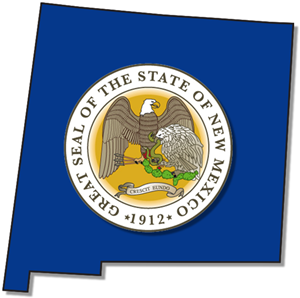 New Mexico law states on the day after each general election, campaign contribution limits increase in accordance with a formula based on the consumer price index.
New Mexico law states on the day after each general election, campaign contribution limits increase in accordance with a formula based on the consumer price index.
Starting November 7, the limits per election cycle are:
- From an individual (person or entity): $2,600 to a non-statewide candidate; $5,700 to a statewide candidate; and $5,700 to a PAC.
- From a PAC: $5,700 to a non-statewide candidate; $5,700 to a statewide candidate; and $5,700 to a PAC.
These limits do not apply to the candidate’s own personal contributions to the candidate’s campaign fund.
September 10, 2018 •
Ask the Experts – Using Federal PAC Funds to Contribute to State Candidates
Here is your chance to “Ask the Experts” at State and Federal Communications, Inc.
 Can I use my company’s federal PAC to make contributions to candidates for state office?
Can I use my company’s federal PAC to make contributions to candidates for state office?

With the exception of Massachusetts, contributions from a federal PAC to non-federal state candidates are permissible. However, the challenging aspect of making these types of contributions is that every jurisdiction has different rules regarding how to register and report such contributions. To make this a little easier to digest, we have broken down the states into five categories. Please note: regardless of the registration and reporting process, in all jurisdictions the federal PAC is subject to the contribution limits according to the law of that jurisdiction.
Category #1: You do not have to do anything. Simply make the contribution to the state candidate as you would any other contribution from your federal PAC. This option is usually only available if your FEC filings are current and complete. Examples of these jurisdictions include Alabama, Delaware, South Dakota, and West Virginia.
Category #2: You must register and report as a state PAC. In these instances, your federal PAC is treated no differently than any other out-of-state PAC. You must register your federal PAC using that jurisdiction’s registration forms. You must report your contributions using state forms and file your reports according to that jurisdiction’s filing deadlines. Examples of these jurisdictions include Connecticut, Georgia, and Tennessee.
Category #3: You may file your FEC registration and reports in lieu of state registrations and reports. The tricky thing about these jurisdictions is keeping track of whether you file your reports according to the jurisdiction’s reporting schedule or the FEC’s reporting schedule. Examples of these jurisdictions include Kentucky, New Mexico, and North Dakota.
Category #4: You have to register using state form and report using your FEC filings, or vice versa. Examples of these jurisdictions include Illinois, South Carolina, and Virginia.
Category #5: You have a choice regarding how to register and report. These two jurisdictions include Iowa and Kansas.
As was mentioned, in Massachusetts, federal PACs may not contribute to campaigns in that state. Federal PACs must establish a separate segregated fund for contributions in Massachusetts and comply with the same requirements as in-state committees. The separate segregated fund must be established as a depository account in a financial institution authorized to transact business in Massachusetts and having its main office, or a branch office, in Massachusetts.
We have not listed PAC rules for all the states, only examples of some states. If you have a question on a state not listed here, please contact us at 330-761-9960
April 4, 2018 •
Massachusetts Updates Campaign Finance Regulations
The Massachusetts Office of Campaign and Political Finance released a draft version of updates to the agency’s regulations taking affect at the end of the month. The changes were subject to a public hearing last month and aim to make […]
 The Massachusetts Office of Campaign and Political Finance released a draft version of updates to the agency’s regulations taking affect at the end of the month.
The Massachusetts Office of Campaign and Political Finance released a draft version of updates to the agency’s regulations taking affect at the end of the month.
The changes were subject to a public hearing last month and aim to make the regulations consistent with changes to campaign finance law and agency practices of the last few years.
Some changes include updated due dates for electronically filed reports, clarifications on when an organization must register as a political committee, and explanations of the circumstances in which an independent expenditure political action committee (PAC) becomes a traditional PAC.
The official effective date of the updated regulations has not yet been announced, and a final copy of the changes will not be publicly available until later this month.
October 24, 2017 •
Montana Contribution Limits Reinstated
This week the 9th U.S. Circuit Court of Appeals reinstated Montana’s voter-approved political contribution limits effective immediately. The limits were ruled unconstitutional in 2016 by a federal district judge in Helena and replaced with contributions limits in place in mid-1990’s. […]
 This week the 9th U.S. Circuit Court of Appeals reinstated Montana’s voter-approved political contribution limits effective immediately. The limits were ruled unconstitutional in 2016 by a federal district judge in Helena and replaced with contributions limits in place in mid-1990’s.
This week the 9th U.S. Circuit Court of Appeals reinstated Montana’s voter-approved political contribution limits effective immediately. The limits were ruled unconstitutional in 2016 by a federal district judge in Helena and replaced with contributions limits in place in mid-1990’s.
The 9th U.S. Circuit Court found the contribution limits in question to be “both justified and adequately tailored to the state’s interest in combating quid pro quo corruption or its appearance.”
The initial lawsuit brought in 2011 claimed the campaign finance laws burdened speech and association. The plaintiffs have already announced their plan to appeal this week’s 2-judge majority decision stating there is no evidence campaign contributions have influenced voting by state lawmakers.
Individual contributions to a gubernatorial candidate have been reduced by about $600 while the limit for what a political action committee can give will now be $660 per election, down from $10,610 per election cycle.
State and Federal Communications, Inc. provides research and consulting services for government relations professionals on lobbying laws, procurement lobbying laws, political contribution laws in the United States and Canada. Learn more by visiting stateandfed.com.

